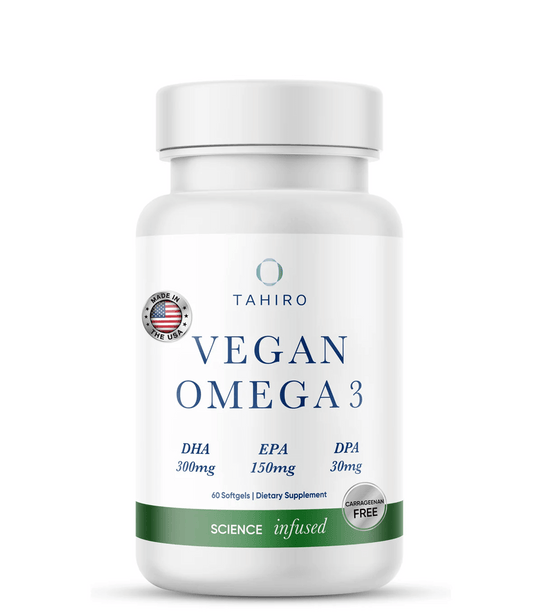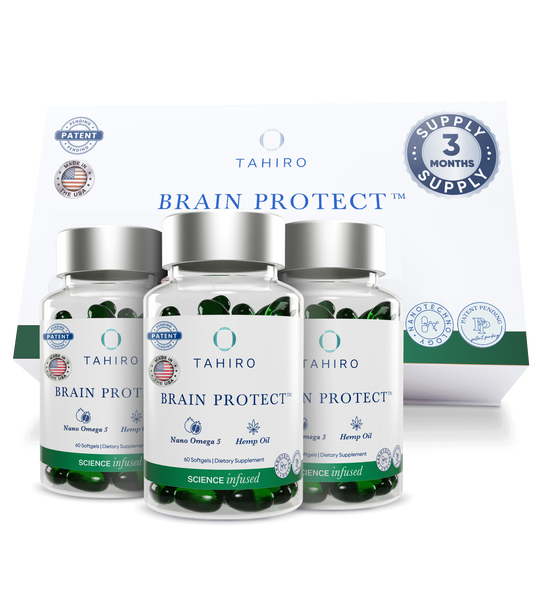Omega-3 fatty acids, known for their potential health benefits such as reduced inflammation, improved heart health, and enhanced cognitive function, can be sourced from various places, including both plant-based and animal-based sources.
However, are all omega-3 fatty acids created equal? Is omega-3 from seafood as effective as omega-3 from algae? In this article, we'll explore the distinctions between omega-3 fatty acids sourced from seafood and algae, including their omega-3 content and which might be the optimal choice for your daily regimen.
Omega-3 Fatty Acids In Seafood and Algae: An Overview
Omega-3 fatty acids are a group of essential fats that the body cannot produce on its own, necessitating their intake through dietary sources. They play crucial roles in various bodily functions, including modulating the immune system, which helps to reduce chronic inflammation. They’re also important for the cardiovascular and nervous systems, among others.
Omega-3s are a group of different fatty acids, which have slightly different properties. There are three main omega-3 fatty acids:
- Alpha-linolenic acid (ALA)
- Docosahexaenoic acid (DHA)
- Eicosapentaenoic acid (EPA)
Omega-3 fatty acids can be obtained from both plant-based and animal-based sources. Good food sources of omega-3s include mackerel, salmon, oysters, flaxseeds, chia seeds, walnuts, and hemp seeds.
If incorporating enough omega-3-rich foods into your daily diet is challenging, supplements made from fish oil or algae oil are available as an option. Taking supplements helps some people to ensure that they consistently get a sufficient dose of these important compounds.
While both seafood and algae provide omega-3 fatty acids, these sources differ in the amount of each specific compound they provide. This means that you can get a different ratio of EPA, DHA, and ALA from each source.
Difference Between Omega-3 From Algae and Seafood
Both algae and seafood are excellent sources of omega-3 fatty acids, but what sets them apart in terms of their omega-3 content?
One of the most significant distinctions lies in their EPA and DHA content. In general, algae contains higher levels of both EPA and DHA than fish. In fact, fish don’t even synthesize their own omega-3s; they get these by eating algae, and then the omega-3s accumulate in their bodies. By going directly to the source and consuming algae, you can get higher levels of these compounds.
Moreover, research indicates that omega-3 bioavailability is notably higher in algae than in seafood, as supported by scientific studies (1). This means that your body will absorb more omega-3s from algae than from seafood. When evaluating the nutritional profiles of algae and seafood, algae emerges as the clear winner.
Does Seafood Provide The Same Amount of Omega-3s As Algae?
Seafood and algae offer varying quantities of omega-3s. Of course, not all types of seafood are the same, and different types contain different amounts of omega-3s. There are also multiple different types of edible algae, which differ in terms of their omega-3 content..
Below, you'll find a table comparing the omega-3 content per 4 ounces in various seafood and algae sources (2)(3).
|
Source
|
Omega-3 Content (mg)
|
| Anchovy |
2,330 |
|
Herring |
2,280-2,440 |
|
Mackerel |
2,100 |
|
Salmon |
1,970-2,440 |
|
Oyster |
500-710 |
|
Clam |
320 |
|
Shrimp |
260-310 |
|
Algae |
100-300 |
|
Crab |
190 |
|
Tilapia |
150 |
|
Cod |
90-180 |
Some seafood sources may contain more omega-3 fatty acids than algae. However, keep in mind that the omega-3 content may vary depending on how the seafood was obtained. Some research shows that the average omega-3 content is higher in wild-caught fish than farm-raised (4). In addition, factors like the local environment and even the season can cause significant variations in the omega-3 content of fish.
By contrast, the omega-3 content in algae is more consistent, meaning that it doesn’t vary significantly from one batch to another. This makes it easier to get a consistent amount of omega-3s each day.
Are Algae-Based Omega-3 Supplements Better Than Seafood?
In many ways, algae-based supplements can be said to be superior to fish oil supplements or other seafood sources in several ways.
Here are the key factors that make algae-based omega-3 supplements the preferred choice over seafood or fish oil omega-3 supplements:
- Optimal EPA and DHA Ratio: Algae-based supplements generally have a more balanced ratio of EPA to DHA. Research has found that the ratio is important in getting the health benefits of the supplement.
- Direct Source: Algae-based supplements provide omega-3 fatty acids directly from the source, bypassing the need to obtain them through the marine food chain. In general, more toxins accumulate in animals that are higher on the food chain.
-
- Sustainability: Algae-based sources are considered more sustainable and environmentally friendly compared to traditional seafood sources. Overfishing is a major environmental issue that is leading to ecosystem collapse in some areas, and using algae avoids contributing to this problem.
- Neutral Taste and Smell: Algae-based supplements avoid the "fishy" taste and smell sometimes associated with seafood supplements and are less likely to cause digestive discomfort.
- Allergy-Friendly: People are much less likely to be allergic to algae than to seafood, making it a safer option for individuals with seafood allergies.
- Low Contaminants: Due to their position at the bottom of the food chain, algae-based supplements tend to have lower levels of contaminants, such as mercury and heavy metals.
For all of these reasons, many people prefer algae-based supplements over seafood or fish oil omega-3 supplements.







